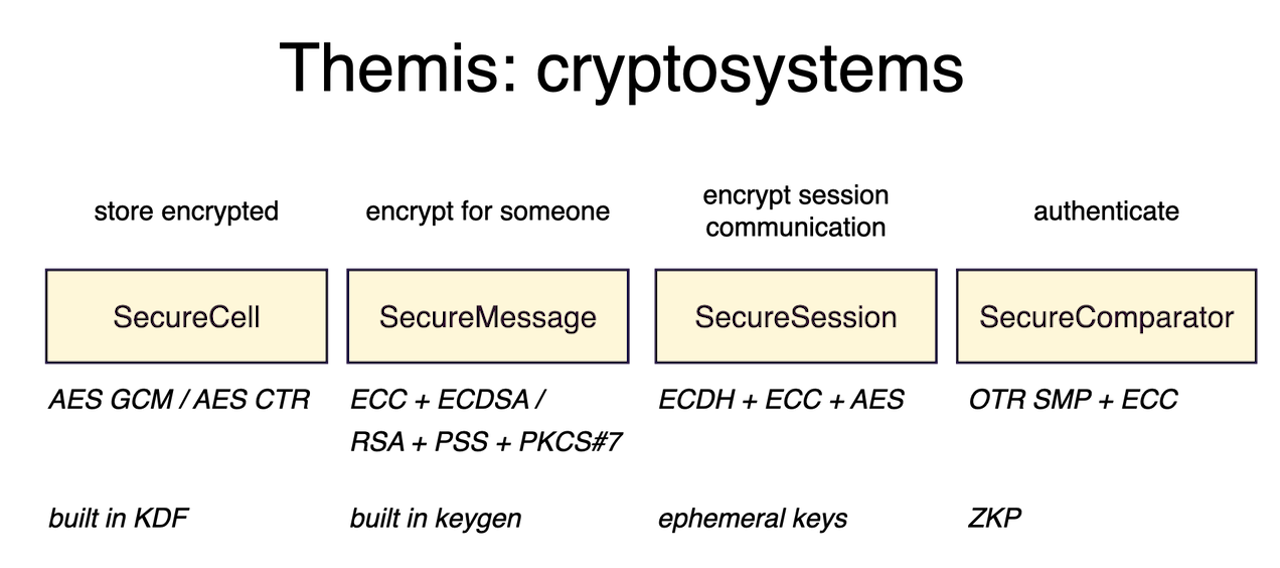Themis in a nutshell #
What Themis is and why it’s awesome

What Themis is #
Themis is a cross-platform high-level cryptographic library for mobile, web, and server platforms. Themis solves 90% of typical data protection use cases that are common for most apps.
Themis provides ready-made building blocks (“cryptosystems”) which simplify usage of core cryptographic security operations.
Learn more about cryptography in Themis.
Why Themis #
Unlike many other cryptographic libraries, Themis is a high-level, easy-to-use and hard-to-misuse library (“boring crypto”).
Themis is made by cryptographers, but is targeted at developers, so it hides cryptographic details under the hood (“secure by design”).
Themis helps to build both simple and complex cryptographic features easily, quickly, and securely. Themis allows developers to focus on the main thing: developing their applications.
Learn more about security design ideas behind Themis and how our team maintains Themis for the last 6 years.
Use cases that Themis solves #
-
Encrypt stored secrets in your apps and backend: API keys, session tokens, files.
-
Encrypt sensitive data fields before storing in database (“application-side field-level encryption”).
-
Support searchable encryption, data tokenisation (FPE) and data masking using Themis and Acra.
-
Exchange secrets securely: share sensitive data between parties, build simple chat app between patients and doctors.
-
Build end-to-end encryption schemes with centralised or decentralised architecture: encrypt data locally on one app, use it encrypted everywhere, decrypt only for authenticated user.
-
Maintain real-time secure sessions: send encrypted messages to control connected devices from your app, receive real-time sensitive data from your apps to your backend.
-
Compare secrets between parties without revealing them (zero-knowledge proof-based authentication).
-
One cryptographic library that fits them all: Themis is the best fit for multi-platform apps (e.g., iOS+Android+Electron app with Node.js backend) because it provides 100% compatible API and works in the same way across all supported platforms.
Themis works in a wide range of projects: power grids, banking apps, telemed apps, documents' exchange platforms, note-taking apps, no-code platforms, remote-debuging platforms, and so on. Themis is recommended by OWASP MSTG to use in mobile apps.
Learn about projects built using Themis and regulations that Themis helps to cover.
Cryptosystems #
Themis provides 4 important cryptographic services:
- Secure Cell: a multi-mode cryptographic container suitable for storing anything from encrypted files to database records and format-preserved strings. Secure Cell is built around AES-256-GCM, AES-256-CTR.
- Secure Message: a simple encrypted messaging solution for the widest scope of applications. Exchange the keys between the parties and you’re good to go. Two pairs of underlying cryptosystems: ECC + ECDSA / RSA + PSS + PKCS#7.
- Secure Session: session-oriented encrypted data exchange with forward secrecy for better security guarantees and more demanding infrastructures. Secure Session can perfectly function as socket encryption, session security, or a high-level messaging primitive (with some additional infrastructure like PKI). ECDH key agreement, ECC & AES encryption.
- Secure Comparator: Zero knowledge proofs-based cryptographic protocol for authentication and comparing secrets.
We created Themis to build other products on top of it – i.e. Acra and Hermes.

What Themis doesn’t solve #
-
Themis doesn’t provide a low-level/raw cryptographic API for encryption and hashing.
For example, Themis doesn’t provide a way to select a certain cryptographic cipher, or key length, or exact elliptic curve, or hash function. There is no API like
let encrypted = encrypt(data, cipher: AES, keyLength: 256, mode: GCM)Instead of thinking about cryptographic parameters, developers take Themis to solve certain functions/requirement of their products. Themis is designed in a way that eliminates typical cryptographic mistakes, and makes development faster, but Themis is not as flexible as OpenSSL.
For those who understand what they are doing and require certain ciphers, Themis allows to change default algorithms and build a custom version.
-
Themis doesn’t have an API for homomorphic or PQ encryption.
-
Themis is not designed to run on low-power hardware, microcontrollers, etc. Themis targets mobile, desktop, and server hardware with x86 and ARM CPUs.
If some of these points are critical for you, consider commercial support.
Community behind Themis #
Open Community page to learn more about authors, projects that use Themis, example apps and tutorials, and engineering talks about Themis.